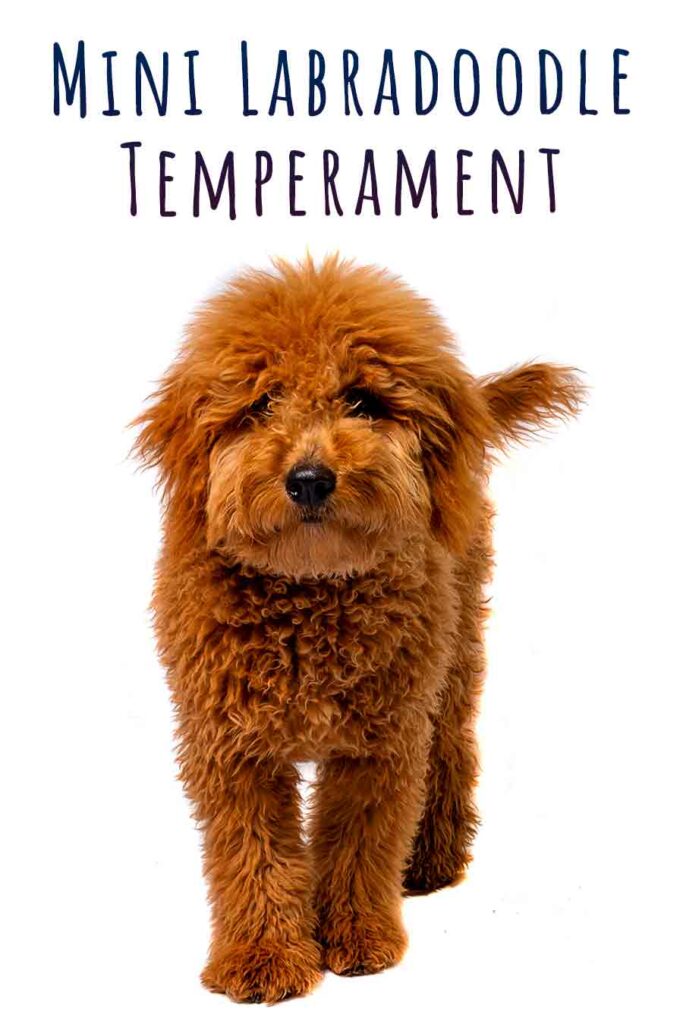In this detailed guide to Mini Labradoodle temperament, we take a look at how Miniature Poodle and Labrador characteristics combine in this popular mixed breed pooch.
Miniature Labradoodle puppies’ temperament typically falls somewhere in between that of a Lab and a Mini Poodle. But there’s lots of possibility for variation between individuals, and some surprising trends too!
Mini Labradoodle Temperament
A Miniature Labradoodle is usually a first generation cross between a Miniature Poodle dad, and a Labrador Retriever mom. They combine the enduring popularity of the Labrador Retriever with the potential for a non-shedding coat. Lots of people are also drawn to Miniature Labradoodle size – being smaller than a purebred Lab means they adapt more readily to homes with less yard space, take up less room on the couch, and cost less to feed, worm, and keep free of fleas.
But the Labrador and Miniature Poodle breeds both have their own distinct temperaments, which are partly determined by their genes, and the result of many generations of selective breeding. So what happens when those two temperaments combine? Are you guaranteed to get the best of both worlds? Is it possible to end up with the worst of both breeds? And is it possible to predict the full grown Mini Labradoodle temperament when you first meet them as a puppy?
We’ll answer all these questions here, so that you can feel confident about choosing (or rejecting) a miniature Labrador Poodle mix as your next pup.

What Decides Mini Labradoodle Temperament?
Dogs’ characters are the product of lots of different influences, including:
- age
- sex
- neuter status
- early socialisation
- training
- physical health
- how much exercise they get
- diet
- previous trauma
- their age when they joined the household
- how much human engagement and interaction they get
- and breed!
Lots of those factors are within our control, which means there’s a lot we can do to shape our puppies’ habits as they grow up. But there’s also lots of evidence that a dog’s temperament is partly hereditary, and determined by their genetic makeup. And it’s that aspect of their personality we’re going to focus on now.
What’s In The Mix?
Mixed breed dogs usually inherit a mix of traits from each of their parent breeds. But some outliers can seem more like one breed than the other – much like human children who especially take after their mom or their dad. Unfortunately, it’s wishful thinking to assume that they’ll only get the best qualities from each breed. For a start, one person’s opinion of which qualities are the best is subjective, and different from the next person’s! Let’s take a look at what possibilities are on the cards.
Labrador Retriever temperament
The iconic Labrador Retriever needs no introduction. They have been America’s top dog for three decades, largely due to their superlative personalities. Labs are:
- Sociable
- Confident with unfamiliar people and dogs
- Playful
- Active
- Affectionate
- Patient with children and other pets
- Adaptable
- Easy to train
Miniature Poodle temperament
Miniature Poodles burst on the companion dog scene in the late 1950s, and gained popularity as a scaled down version of the pre-existing Standard Poodle. The Standard Poodle was originally developed as a successful gundog, but Miniature Poodles have lost some of the traits associated with successful gundog traits, and gained new ones which make them better adapted to companion roles. They tend to be:
- Energetic
- Clever
- Confident
- Talented problem solvers
- Devoted
- Protective
- Vocal
- Quick to learn new cues
Compared to the Lab, Mini Poodles tend to be less magnanimous about sharing their human family with other pets. Traditionally, the most devoted Miniature Poodles were also the most sought after, and the flip side of this is that they can see other pets as rivals and react noisily or aggressively towards them.
Other than that, there are obviously quite a lot of similarities between our two breeds. They are both energetic, playful, affectionate and clever, so their offspring are likely to be the same again. But what happens when their differences collide? Let’s see!
Mini Lab Poodle Mix Temperament
As a mixed breed, we would expect Mini Labradoodle temperament to fall somewhere in between Labrador and Mini Poodle characteristics, or combine aspects of both. And one recent study of Labradoodle behavior found that this is true of at least three areas in which they’re usually different. Specifically:
- non-social fear (eg. fear of fireworks or new places),
- touch sensitivity,
- and separation anxiety.
On average, Miniature Poodles scored significantly higher for these behaviors than Labradors, but Mini Labradoodle scores fell about halfway in between. So a Mini Labradoodle is likely to be less prone to non-social fear, touch sensitivity and separation anxiety than a Miniature Poodle, but more prone to them than a purebred Labrador.
But it’s not always the case that Mini Labradoodle scores reflect an average of Labrador and Mini Poodle scores. The same study also measured one other trait – dog rivalry. Dog rivalry was defined as “showing aggressive or threatening responses to other familiar dogs in the same household”. Labradors have generally low scores for dog rivalry, and Miniature Poodles typically score much more highly, as we discussed above. But rather than falling somewhere in between, Labradoodle scores were very closely aligned to Labrador scores, and significantly lower than Miniature Poodle scores. It’s not yet clear if there is a reliable genetic basis for that though!
Are Miniature Labradoodles Easy To Train?
Both Labs and Mini Poodles are easy to engage in training, and readily motivated by the prospect of tasty rewards. They’re also intelligent, and quick to remember new commands. So, Mini Labradoodles are usually easy to train too.
Trainability might vary a bit between Mini Labradoodles with a working Labrador parent and Mini Labradoodles with a show Labrador parent. Working Labs have an almost obsessive need for mental stimulation. They learn especially quickly, but novice dog owners are more likely to describe them as being overwhelming to keep up with. Their puppies are a good choice if you enjoy dog sports and you’d like to get into activities like agility training with your dog. A Miniature Labradoodle from a show Labrador is probably more suitable as a family pet in some cases.
Mini Labradoodle vs Standard Labradoodle Temperament
How does a Mini Labradoodle compare to their better known older brother? Mini Labradoodles can seem more clingy than Standards, because Miniature Poodles were originally bred as lap dogs. Frequently seeking out their owner’s company was seen as a desirable quality in this role. In the study above, Standard Poodle scores for non-social fear, touch sensitivity, separation anxiety and dog rivalry were already much more closely aligned to Labrador scores, compared to Mini Poodles. So, Standard Labradoodle temperament is, in some ways, more predictable and less variable than Mini Labradoodle temperament.
Does Color Change Mini Labradoodle Temperament
There’s no concrete evidence that coat color is directly linked to personality in Mini Labradoodles. However, coat color is indirectly linked to trainability in Labradors, because breeders have traditionally preferred black dogs as working dogs. So they have created breeding lines which combine both intelligence and a black coat. Meanwhile, yellow Labs have traditionally been favored as service dogs. And poor chocolate Labradors have a reputation for being the least trainable color of all (which is all relative – they are still very smart!).
In short, a black Labradoodle might be extra smart if their mom is a top notch working Lab, and a full grown chocolate Labradoodle might take a little longer to learn new cues. But it’s not set in stone.
Mini Australian Labradoodle Temperament
Australian Labradoodles are a breeding project which started in the 1990s to try and establish some lines of Labradoodles as a new pedigree dog breed in their own right. Australian Labradoodles are all multigen dogs, and they come in three distinct sizes, including a miniature size which weighs as little as 15 pounds. The Worldwide Australian Labradoodle Association describes their dogs as easy going and friendly. It’s worth noting that according to recent genetic analysis, they have ended up much more closely related to Poodles than Labradors. So it’s reasonable to predict that their personalities are likely to be more like a Poodle on average too.
Choosing a Baby Labradoodle With The Right Personality For You
So, a Mini Labradoodle is likely to have some traits in common with both breeds, some qualities which are especially like one or the other, and some qualities which are half way between the two. Which begs the question, how can you tell which puppy from a litter will have the right character for you?
Alas, the answer is ‘you can’t really’. Mini Labradoodle puppies’ temperament is not a reliable predictor of their adult personality. But, you’re more likely to enjoy your small Labradoodle’s temperament if you liked both of their parents, so ask to meet both before you put yourself on the waiting list. If your breeder is very experienced, they might also be able to recommend a puppy for you by the time they’re ready to go home. And remember, there are lots of ways that full grown Mini Labradoodle temperament is shaped by the decisions you make after you bring them home!
But, if any breed-specific traits are a priority for you, then ultimately you might be better off with either a Lab or a Poodle instead.
Mini Labradoodle Temperament – Summary
What are your views on Labradoodle size? Do you prefer a big Labradoodle or small Labradoodle overall? Let us know in the comments box down below!
Don’t Miss
- Do Mini Labradoodles shed? (including the answer to ‘are mini labradoodles hypoallergenic?’)
- Multigenerational Labradoodle
- Australian Vs American Labradoodle
- Life with a Labradoodle and Kids
- Big Labradoodle
- Are Labradoodles Crazy Dogs?
References
Ali et al. Genetic analysis of the modern Australian labradoodle dog breed reveals an excess of the poodle genome. PLOS Genetics. 2020.
Robinson et al. Puppy Temperament Assessments Predict Breed and American Kennel Club Group but Not Adult Temperament. Journal of Applied Animal Welfare Science. 2016.
Serpell & Duffy. Dog Breeds and Their Behavior. Domestic Dog Cognition & Behaviour. 2014.
Serpell & Hsu. Effects of breed, sex, and neuter status on trainability in dogs. Anthrozoos. 2005.
Shouldice et al. Expression of Behavioural Traits in Goldendoodles and Labradoodles. Animals. 2019.
Wallis et al. Cross-Sectional Age Differences in Canine Personality Traits; Influence of Breed, Sex, Previous Trauma, and Dog Obedience Tasks. Frontiers in Veterinary Science. 2020.
Wauthier et al. Using the mini C-BARQ to investigate the effects of puppy farming on dog behaviour. Applied Animal Behaviour Science. 2018.

